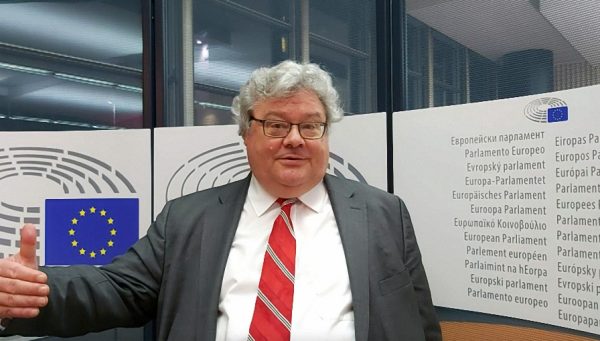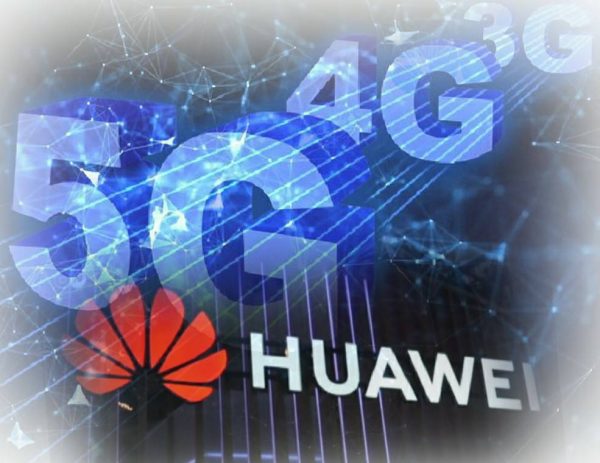
译者按语:华为5G一直是中国政府志在必得的一招棋,它不仅是可以获得垄断性暴利的最新通信技术,也能凭借它来统领世界资讯,掌握全球各国政府民间,事无巨细的资讯和情报。西方工业国家对中国的5G始终抱有怀疑的态度,华为受制于中国法律,必须臣服于政府的指令,这就对他国的国家安全构成威胁。如今美国、英国、澳大利亚、日本都禁止华为参与本国5G网络的建设,新近比利时也加入此行列。欧盟一些国家都认识到华为和中兴会对欧洲网络安全造成伤害。以欧洲议会对华关系代表团负责人莱因哈德·比蒂科夫Reinhard Bütikofer为首的40 多名欧洲议会议员,于10月14日发信给欧盟电信部长及高层官员一封联署信,其中指出欧中通信公司在双方的市场准入方面不公平、不对等。欧盟甚至以纳税人的钱来补贴中国公司。华为、中兴这些公司是“依法”接受中国政府指令的,会利用网络来控制本国人民,并且对西方政府、公司和民众进行间谍活动,他们属于“高风险”的供应商,为保护欧洲5G的应用安全,欧盟应当对此警惕,并进行评估、定位。
现将此信译为中文,以飨读者。该信原文附于后。
致欧盟电信和贸易部长以及欧洲委员蒂里·布雷顿、玛格特·韦斯塔格和瓦尔迪斯·多姆布罗夫斯基斯的信函(2020年10月14日17:54发布)
我们是五个不同政治团体的欧洲议会议员,我们一致担忧欧洲的5G安全,以及欧洲与中国之间,5G供应商的不公平竞争。面对将于10月15日举行的非正式TTE委员会(译者按Transport, Telecommunications and Energy Council运输、电信和能源委员会),我们写这封信给您,敦促您对提出的问题采取行动。
我们从COVID-19危机中认识到,在关键领域保持知识、能力和一定程度的独立性,包括医疗/制药、食品供应和公用事业,即能源、水和通讯基础设施,对于我们的生存是不可或缺的。
在连通性(connectivity)方面,通过COVID-19的经验,我们也了解到,在处理应对危机,以及保持经济和基本服务持续运行方面,固定和移动的连通性是多么地重要。
早在危机爆发前,欧洲委员会就已经采取了许多举措来维护我们的安全与主权,而今天证明这些举措比以往任何时候都更加重要。这些措施包括革新的、以数字化和互联为核心的工业战略;为互联、网络安全和人工智能提供更多资金的提案;监控投资(风险)的机制,以避免有害的外国来接手欧盟的关键企业;促进互惠的贸易政策举措;还有更具体的:对5G安全的风险性,进行全面的评估,同时设计舒缓困局的应变方案。
5G是欧洲数据化主权的核心部分,5G作为欧洲的关键基础设施,欧盟5G安全倡议把维护5G的安全作为至高的目标,这是十分正确的。根据这一倡议,我们必须在技术上,有可靠、并且安全的方案,来确保5G的安全,网络的敏感部分,要排除采用那些属于“高风险”一类的供应商,在中期和长期的时间段内,维护欧洲的(高科技)知识,避免过度依赖或依靠那些“高风险”供应商。
全球可供考虑的5G供应商有欧洲的爱立信和诺基亚,以及中国的华为和中兴。与所有中国公司一样,根据中国法律,后者须配合中国的非民主的专制政权。这包括使用网络控制自己的人民并收集西方政府、公司和民众的情报。因此,毫无疑问,华为和中兴是“高风险”供应商,它们在欧洲5G网络中的技术将构成安全威胁。
在5G供应商的市场准入方面,欧盟与中国之间也全然缺乏互惠。尽管欧盟对中国的供应商开放市场,但中国对欧洲供应商却几乎完全关闭了他们的市场,这跟中国政府做出了的承诺刚好相反。2020年上半年,首次大规模的5G招标,涵盖了中国数十万个移动基站的销售和部署,中国供应商所占的市场份额已接近90%。
除了享受独占国内巨大市场的好处外,中国的供应商还获得数十亿欧元的公共补贴,根据欧盟的国家援助规定,欧洲本身的供应商却无法获得这些补贴。这些优势帮助华为发展成庞大的全球性企业,它不公平地把竞争对手在价格上比下去。
基于欧洲议会2019年3月12日,关于中国技术提升所造成的安全威胁之决议,以及欧洲理事会2020年10月1-2日的决议,我们认为在COVID-19大流行的背景下,以下行动已经变得更加紧迫:

第一步,我们敦促欧洲委员会和欧盟成员国加强实施5G安全缓解措施;对“高风险”供应商进行联合评估和分类;扫描所有国家和欧盟的资金,资助的项目以及EIB(欧洲投资银行)贷款等,以确保根据5G工具箱(译者按:5G工具箱 toolbox是欧洲委员会于今年一月份所建立的一个保护5G安全的设施,可以模拟、分析和测试5G通信系统)“支援行动10”的目标,欧洲资金,即纳税人的钱,不会用于支付“高风险”电信设备供应商所提供的技术。在欧盟支出下一个MFF(译者按:Multiannual financial framework多年期财务框架)和回收基金时,也应该严守此规则。
第二,还有更多同步的行动,其中包括迅速批准由欧洲委员会提议,并得到欧洲议会支持的《国际采购规则》。按照该规则,对于那些限制欧洲公司进入本国采购市场的第三国,欧洲的公共采购市场也应该对他们关闭。
第三,我们也强烈支持委员会的承诺,即提出一项类似的准则,对那些获得本国(政府)实质性补贴的第三国公司,应限制他们进入(欧洲)单一市场的机会,他们不顾公平竞争、占欧洲同行的便宜,借此占据了全球的市场 。欧盟委员会关于外国补贴的白皮书是一个很好的起点,应当将补贴的定义扩大,引入更严格的透明度,制裁违规行为,并且我们假定在特殊案例中,存在着变态的竞争。展望未来,我们敦促欧盟委员会探索并订出类似的新规则,以促进互惠和应对不公平贸易做法,例如,中国强制许多在华的欧洲企业进行技术转让。
布鲁塞尔,2020年10月14日
以下40多位议员的名字,请见所附原文
原文如下
Letter to EU telecom and trade ministers and to European Commissioners Thierry Breton, Margrethe Vestager and Valdis Dombrovskis
Veröffentlicht am 14. Oktober 2020 um 17:54 Uhr.
We, the undersigned Members of the European Parliament from five different political groups, share a common concern regarding 5G security in Europe and unfair competition between European and Chinese 5G vendors. Therefore, we send this letter to you in preparation of the upcoming informal TTE Council on 15 October, urging you to take action on the points raised.
We have learnt from the COVID-19 crisis that maintaining know-how, capacity and some level of independence in critical sectors, including medical/pharmaceutical, food supplies, and utilities, i.e. energy, water and communications infrastructure is indispensable for our survival.
In the area of connectivity, COVID-19 has demonstrated how vital fixed and mobile connectivity is to help fight the crisis and to keep the economy and essential services running to the extent possible.
The European Commission has, already pre-crisis, launched a number of initiatives to preserve our security and sovereignty, which today prove to be more relevant than ever before. These include a renewed industrial strategy with digitization and connectivity at its heart, increased funding proposals for connectivity, cyber security and AI, the investment screening framework to avoid harmful foreign take-overs of critical EU businesses, trade policy initiatives promoting reciprocity, and more concretely, the 5G security joint risk assessment and toolbox of mitigating measures.
5G is a central element in Europe’s digital sovereignty and the EU 5G security initiative rightly has the aim of safeguarding the security of 5G as a critical infrastructure for Europe. In line with this initiative, 5G security needs to be promoted by ensuring technically sound security solutions, excluding vendors falling into the ‘high-risk’ category from sensitive parts of the networks and, in the medium- and longer term, maintaining European know-how and capabilities in order to avoid overreliance or dependency on ´high-risk´ vendors.
The most relevant 5G vendors globally are the European Ericsson and Nokia, and the Chinese Huawei and ZTE. As all Chinese companies, the latter are obliged under Chinese law to comply with China’s undemocratic authoritarian regime. This includes using networks to control its own population and to spy Western governments, companies and citizens. There is therefore no question that Huawei and ZTE are ‘high-risk’ vendors, whose technology in Europe’s 5G networks would constitute a security threat.
There is also a blatant lack of reciprocity between the EU and China in the market access of 5G vendors. While EU’s market is open for China’s vendors, China has almost completely closed its market for European vendors, despite China’s promises to the contrary. In the first half of 2020 the first extensive 5G tenders covering the sales and deployment of hundreds of thousands of mobile base stations across China, Chinese vendors have been allocated a market share reaching close to 90 percent.
In addition to enjoying the benefits of a vast and increasingly exclusive home market, China’s vendors have benefited from billions of euros of public subsidies that are not available for European vendors under EU’s State aid rules. These advantages have helped Huawei in particular grow into a huge global enterprise that can unfairly price-out its competitors.
Building on the European Parliament resolution of 12 March 2019 on security threats connected with the rising Chinese technological presence, and in support of the European Council conclusions of 1-2 October 2020, we see that the following actions have become even more urgent in the context of the COVID-19 pandemic:
As a first step, we urge the European Commission and the EU Member States to intensify the implementation of the 5G security mitigating measures; to carry out a joint assessment and categorization of ‘high-risk’ vendors; to scan all national and EU funds, funded projects, and EIB loans etc, in order to ensure that according to the aim of ‘Supporting Action 10’ of the 5G Toolbox, no European funding, i.e. taxpayer’s money, will cover the use of technology from ‘high-risk’ telecom equipment vendors. This principle should also strictly apply to EU spending in the context of the next MFF and the recovery fund. Second, more horizontal actions should include a swift approval of the International Procurement Instrument as proposed by the European Commission and supported by the European Parliament. With this instrument, the European public procurement market can be closed to companies of those third countries that restrict European companies’ access to their own procurement markets. Third, we also strongly support the Commission’s commitment to propose a similar instrument to reduce the access to the single market of companies from third countries that have received substantial state support from their home states, especially if this allows them to dominate the global market at the expense of fair competition, and at the expense of European players. A good starting point is the Commission’s White Paper on foreign subsidies, which should be reinforced by broadening the scope of what is a subsidy, introducing stronger transparency requirements and sanctions for non-compliance, and introducing the presumption that competition has been distorted in specific cases. Going forward, we urge the Commission to explore options for similar new instruments to promote reciprocity and to tackle unfair trade practices, for instance, the Chinese practice of forced technology transfers, to which many European businesses operating in China are subject to.
Brussels, 14 October 2020
Petras Auštrevičius(Renew, Lithuania)
Andrus Ansip (Renew, Estonia)
Erik Bergkvist (S&D, Sweden)
Damian Boeselager (Greens/EFA, Germany)
Geert Bourgeois (ECR, Belgium)
Reinhard Bütikofer (Greens/ EFA, Germany)
Daniel Caspary (EPP, Germany)
Jakop Dalunde (Greens/EFA Sweden)
Giuseppe Ferrandino (S&D, Italy)
Daniel Freund (Greens/EFA, Germany)
Helmut Geuking (ECR, Germany)
Sven Giegold (Greens/EFA, Germany)
Bart Groothuis (Renew, Netherlands)
Christophe Grudler (Renew, France)
Francisco Guerreiro (Greens/EFA, Portugal)
Henrike Hahn (Greens/EFA, Germany)
Christophe Hansen (EPP, Luxembourg)
Heidi Hautala (Greens/EFA, Finland)
Pär Holmgren (Greens/EFA Sweden)
Miriam Lexmann (EPP, Slovakia)
Nathalie Loiseau (Renew, France)
Ulrike Müller (Renew, Germany)
Dominique Riquet (Renew, France)
Petri Sarvamaa (EPP, Finland)
Maria Spyraki (EPP, Greece)
Jessica Stegrud (ECR, Sweden)
Radosław Sikorski (EPP, Poland)
Evzen Tosenovsky (ECR, Czechia)
Rasa Juknevičienė (EPP, Lithuania)
Eva Kaili (S&D, Greece)
Assita Kanko (ECR, Belgium)
Petra Kammerevert (S&D, Germany)
Zdzsislaw Krasnodebski (ECR, Poland)
Andrius Kubilius (EPP, Lithuania)
Alice Kuhnke (Greens/EFA, Sweden)
Miapetra Kumpula-Natri (S&D, Finland)
Christel Schaldemose (S&D, Denmark)
Paet Urmas (Renew, Estonia)
Viola von Cramon-Taubadel (Greens/EFA, Germany)
Witold Waszczykowski (ECR, Poland)
Salima Yenbou (Greens/EFA, France)
台湾《民报》首发
